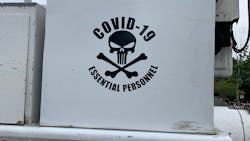COVID-19 and Overhead Construction: Critical Steps to Survive
In the midst of the ongoing COVID-19 crisis, a reasonable, effective action plan for overhead construction crews and field management is necessary. The high transmission property of this virus, and its deadly potential, makes the need for a fast and workable plan, with the concurrence of all stakeholders, of paramount importance.
A multifaceted, comprehensible approach is required. Linemen perform a very “essential service,” and their well-being must be assured to make sure that they continue to serve the needs of the society at large. Just imagine for a moment what would happen with hospitals, nursing homes, public places, testing facilities, supermarkets, etc., without electrical power. What a disaster and a nightmare!
Besides, under the OSHA’s ‘General Duty Clause”, the employer must provide employment and a place of employment free from any recognized hazards that are causing or likely to cause death or serious physical harm to any employee. Of course, each employee must follow all safety rules, regulations and practices that apply to his or her job function. So, the following suggestions/practices seek to provide a proposed plan to address the current situation:
The Individual is the Focus
- “Best Practice” hygiene to be practiced at home. Social gatherings with family and others to be controlled and limited.
- If not working, stay home. Help reduce the spread, and save lives!
- If working, upon arrival at the show-up location, crew members to stay in their vehicles. Unnecessary meetings discouraged, especially in office trailers, or other limited, small locations.
- Each foreman to meet the general foreman or supervisor on a one-to-one basis to discuss/assign jobs for the day.
- Each foreman and crews to use proper hygiene throughout the day. Wipe clean all material and tools used. Special attention to cleaning steering wheels, truck cabs, and other accessories used throughout the day.
- Wash hands often. If available, use disinfecting wipes quite often. List of EPA-approved disinfecting products available via this link.
- Practice “social distancing” as much as possible. Do not congregate in the yard or at job sites. Keep the public at bay.
- If practical, wear safety mask over your mouth and nose. Make sure there is no problem wearing your required safety glasses.
Control and Surveillance
- Practical, reliable, effective and safe screening method required. Upon arrival, each worker to be screened at a designated location. Temperature readings taken and recorded daily, in the AM and PM. The person designated to take the readings must wear required PPE.
- Crew members to be vigilant for any signs of sickness among themselves. Rapid management determination required to send sick workers home or to the hospital.
- Follow instructions from EHS Management on how to address cases of high temperature readings and/or infected persons.
- Coordinate/work with local unions on effective responses.
Paid Sick Leaves/Federal Funds
- Linemen and/or field management to get clear, precise instructions from EHS Department on paid sick leaves.
- Detailed protocols developed and implemented.
- Follow-up procedures and Return-to-Work policy required.
Enhance Your Immune System (consult your doctor or licensed health care practitioner)
Some proposed nutrients are:
- Build up your immune system--”Last Line of Defense!"
- Drink plenty of water daily.
- Vitamin C in powder (Buffered) with Bioflavonoids.
- Green tea extract
- Licorice roots
- Stragula/Equinacea tea/tincture
- Elemental Zinc/Co-Q10 capsules or liquid
- Vitamin D/Coconut oil/Oregano oil
- Manuka honey/Black Elderberry syrups
During your daily job briefing, please allocate enough time to discuss steps taken to assure proper cleaning, protection and spread prevention. Work with your EH&S Department to include a reasonable, workable Emergency Plan for COVID-19 in the Environmental, Health and Safety Plan (EHAS).
Again, remember, we are battling this plague together. We all depend on each other. Yes, Linemen provide an “essential service," and it is necessary that they do their job safely and while being safe, not sick or infected. As a friend of mine says, “Linemen: Any Pole, Anytime, Anywhere!"
About the Author
Luis Ortega
Luis Ortega, CUSP, is a freelancer in occupational safety and related technical fields. For the last four years, he has worked as a safety specialist at Northline Utilities LLC, a T&D contractor in New York State. Ortega is proficient in OSHA, NESC, and other safety-related entities. He retired from Consolidated Edison Co. after a 30-year career. After 20 years of experience as a senior engineer in the Electrical Distribution Engineering Department at CoEd, he transferred over to the Overhead Construction Department to work as an operating line supervisor. At the end of his career, he worked as a quality assurance manager in the Electrical Ops. Organization. He holds a technical certificate from Power Technologies, Inc., and a bachelor of civil engineering from CCNY.
